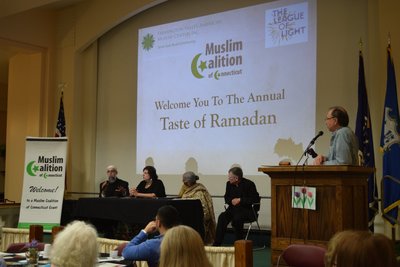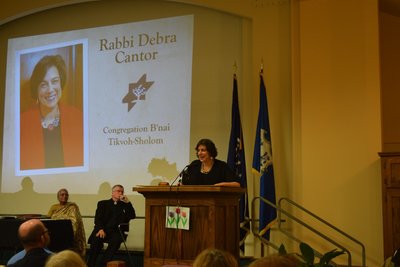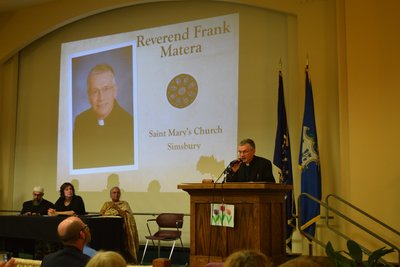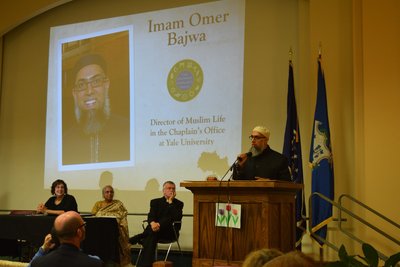|
“All human cultures feast and fast,” said Rabbi Debra Cantor of B’nai Tikvoh Shalom in Bloomfield as part of a panel discussion on fasting celebrating at the Taste of Ramadan on June 3, 2018 in Avon, Connecticut. The Farmington Valley League of Light, a multi-faith community, co-sponsored the evening along with the Muslim Coalition and the Farmington Valley American Muslim Center.
Imam Omer Bajwa, Muslim Chaplain and Director of Muslim Life at Yale, told the audience that Ramadan comes from a word meaning intense heat. If you heat iron and steel at extreme temperatures over time exposure to the heat will break them down making them malleable and you can shape them. Souls like iron over the year become hardened. Periodically, God is calling you to recalibrate, reform your soul. Ramadan is a fasting holiday, and fasting cleanses one’s soul. “Fasting is a physical exercise and a spiritual discipline bringing ultimately spiritual enlightenment,” Bajwa said. “Restriction leads to expansion of mind, heart and soul.” Fasting traditions in the four religions represented (Hinduism, Judaism, Islam and Christianity) shared many similarities such as deep reflection and giving to charity. All the religions share commitment to social justice, and caring for the poor and vulnerable. “It is a chance to reflect upon who we are, who we ought to be, who God calls us to be and to recommit to what is right personally and as a society,” said Cantor. Dr. Shyamala Raman, a University of Saint Joseph professor and a representative from the Hindu tradition, said “Fasting is a spiritual exercise in contemplation and self-discipline in Hindu. It is a universally embedded prayer.” Hindus fast according to the phases of the moon as Jews and Muslims also follow the lunar calendar. Rev. Frank Matera, of St. Mary’s Church in Simsbury, said Christians fast in secret to remain humble before God. The big fast is Lent, modeled after Jesus’ fast in the wilderness for 40 days and 40 nights. The three reasons Christians fast are to celebrate Easter, prepare for baptism, and confession. “It disciplines our body and purifies our spirit,” said Matera. “Fasting is the soul of prayer and mercy is the lifeblood of fasting. It brings one closer to God and makes one aware of the needs of others.” It’s all about service to others Bajwa described fasting as “a physical waking up and a spiritual waking up.” “One asks what kind of person am I and what kind of person do I want to become,” he said. “An intimate personal experience can lead to a collective consciousness.” Individual sins reflect community transgressions. Cantor quoted Abraham Joshua Heschel “Not everyone is guilty but all are responsible.” Maybe, in a way, society as a whole created mass shootings and terrorism with its neglect of poverty and alienation. “We have to take responsibility for what we do as a community,” said Bajwa. A social media fast Cantor also talked about taking a fast from screens and social media on Shabbos. Bajwa suggested we self-monitor the verbal violence online and on social media. “Fasting makes us think deeply about the way we use language,” Bajwa said. “God is found in our service to each other.” Emptying to become spiritually full Emptying to become spiritually full Raman remarked that “Fasting helps one self-empty so you can allow God to enter.” Matera also echoed this sentiment about emptying the self and the weakness people feel during a fast. “In a moment of weakness we find strength,” he said. “If you are filled with ego, there is no place for God to enter us,” said Cantor. As the Muslims believe, humility is like a sprout buried deep in the ground. One has to bury it deep not shallow for it to develop and grow,” said Bajwa. Just like the sprout, we have to take stock in deep reflection in order to grow and learn our true mission on earth to serve others. Fasting helps us do that.
0 Comments
Ramadan began on May 16 this year and will be observed for a month. There will be a Taste of Ramadan open house and breaking of the fast on June 3 at 5:30 pm at the Avon Senior Center on West Avon Rd. For more information, click here. Our Guest Blogger, Alexis Zinkerman, interviewed Khamis Abu-Hasaballah, the President of the Farmington Valley American Muslim Center. The subject was Ramadan, an important holiday for the Muslim community. “Ramadan is one of the five pillars of Islam, an obligatory ritual that every adult Muslim has to observe,” said Khamis Abu-Hasaballah, President of the Board of Trustees of the Farmington Valley American Muslim Center in Avon, Connecticut. Ramadan is a fasting holiday when Muslims abstain from food, drinks, and intimate relations. These requirements can go on for 10 hours a day in winter to 16 hours a day in summer. “Ramadan is a chance for spiritual cleansing and conscious piety,” he said. “Conscious piety means that you are constantly aware of the presence of God.’’ Khamis indicated that people go to work and school and play sports all while fasting. With the exception of nursing mothers, the sick and the elderly, everyone has to fast once they have reached puberty. And if a temporary illness affects someone, he/she can make up the fast when he/she is better. The holiday is about hunger too. “When you experience hunger and spend long days without food or drink, you get to appreciate what people who don’t have access to food go through,” he said. “Not only can we sympathize with them, but we can empathize and help them.” This is similar to the Jewish holiday of Yom Kippur and other shorter-term fasting festivals throughout the year. In Islam, giving charity or Zakatul -fitr (alms) is a way of cleansing and perfecting the fast. It is paid towards the end of Ramadan to assist those who may not have enough funds to share in the celebration on the day of Eid-ul-Fitr. This day of Eid-ul-Fitr (or the celebration of the end of fasting) officially ends Ramadan, and Muslims resume normal eating and drinking, as they would do on any day outside of Ramadan. “One of my favorite and most powerful verses in the Koran is ‘There is no compulsion in religion,’ it’s a principle in Koran from 14th centuries ago, and it means freedom of worship which is cherished in this country today,” said Khamis. “Even though many people misunderstand what Islam is about, Islam promotes this truth: that no one has to change the way they worship.” Khamis said that the mosque has been received quite well in this part of the state. They have received more requests from non-Muslims thirsty for knowledge…’’more than we can handle… That is where League of Light group comes in.” The League of Light is a multi-faith council of members in the Farmington Valley and Hartford area who spread awareness about issues and events of faith AuthorAlexis A. Zinkerman Do Good. Tell Stories. Be Mindful. |
A New Blog from Farmington Valley League of Light
5/30/2018 Today the Farmington Valley League of Light is launching a new blog! Since we are eager to communicate with you on topical issues, we will be posting our blog periodically as a complement to our regular Community Updates.
Our guest blogger is Alexis Zinkerman, an experienced blogger who is a volunteer with League of Light. Archives
August 2018
Categories
All
|






 RSS Feed
RSS Feed
